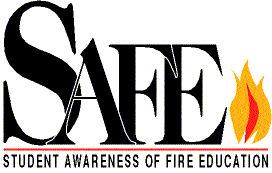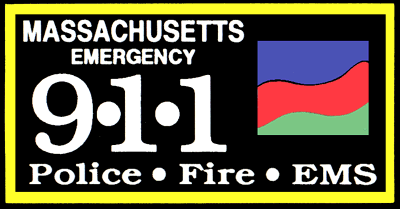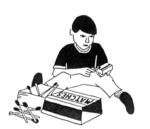|
|
|
|
MERRIMAC FIRE DEPT. · All Rights Reserved ·
 |
MERRIMAC FIRE DEPARTMENT Home Page Contact Us Favorite Links Firefighter of the Year Awards 2000 Open House 2000 PUBLIC EDUCATION Members of the Merrimac Fire Department offer the following courses:
 The Student Awareness of Fire Education (S.A.F.E.) Program is a state initiative to provide resources to local fire departments to conduct fire and life safety education programs in grades K-12. The mission is to enable students to recognize the dangers of fire and more specifically the fire hazards tobacco products pose.
There are 23 Key Fire Safety Behaviors which are taught in age and developmentally appropriate ways, such as:

Benefits
Since the program's inception in 1995, more than 150 children throughout the Commonwealth who participated in the S.A.F.E. Program have saved themselves or a loved one, and were honored as Young Heroes by the Department of Fire Services. Some success stories are:
DFS provides programmatic support to local S.A.F.E. Programs through in-service training, site visits and technical assistance. The Massachusetts Firefighting Academy provides training to fire educators. Fiscal Affairs manages the financial side of the grant applications. Who to Contact For more information on the S.A.F.E. program from Merrimac Fire or to have a Public Fire & Life Safety Educator speak to your group or organization, please contact S.A.F.E. Coordinator Michael McLeieer at (978) 346-4731 or (978) 346-8211 or click on the link under the name to send an e-mail message. If you are located outside of the town of Merrimac, we will be happy to connect you with a Public Fire & Life Safety Educator in your area.

According to the
National Fire Protection Association, children playing with fire is the
fourth leading cause of fires that kill. Arson is the second leading cause
of residential fire deaths and accounts for approximately 25% of all fires
in the United States. Juvenile arson accounts for over 50% of arson
arrests, the highest FBI indexed crime involving juveniles. Hundreds are
seriously burned or injured each year when children who are curious start
fires.
Children and Fire Children are fascinated by fire; the warm glow of a fireplace, flames flickering in a camp fire, blowing out birthday candles, watching the repetitive habit of an adult lighting up a cigarette. Children as young as 2 years may show an interest in fire. With this natural fascination and curiosity comes the task for parents/caregivers to take fire safety precautions with younger children and to educate and train older children in fire safety. Whether a child is merely curious about
fire, making a cry for help or engaging in delinquent behavior, children
playing with fire is extremely dangerous. Children can be helped. They
must received the right kind of help though. It is not a phase that they
will grow out of, it is not a matter of boys being boys. Yelling at them,
burning their fingers or other such methods will not be effective. The
reason a child plays with fire must be addressed in order to successfully
address the problem. Each child must be individually assessed and receive
a treatment program that may contain one or more of the following components:
educational, psychological, and community service.
. What is Fireplay? Fireplay happens when a child, curious
and unsupervised, plays with matches, lighters, an open flame or a hot
stove. This playing accidentally starts a fire that may result in death
injury and/or property damage.
In some children, fascination and fireplay
turn into intentional and repeated firesetting behaviours. These children
usually have underlying psychological or social problems, and account for
40% of all children who start fires. Helping these children includes stopping
firesetting behaviour immediately and correcting the underlying problems
that caused the behavior. Juvenile firesetting is a dangerous
behavior that cannot be stopped without appropriate intervention, intervention
that addresses why the child sets fires.
Warning Signs (Red Flags) ABOUT THE CHILD:
If your child has "played" with fire on more than one occasion or has deliberately started a fire, or if you are unsure about educating your child about fire safety, you should seek help through your local Fire Department. Merrimac Fire Department has trained personnel who can help the curious child to understand that playing with fire is very dangerous. Deliberate firesetting is a serious matter. Children who have deliberately started a fire may be indirectly indicating that they are having problems.
The Merrimac Fire Department believes that a coordinated, consistent and appropriate response using treatment, education, deterrence, and prevention is the best method to reduce the risk of fire to youth, their families, and their communities. The RVJFIP will service children between the ages 3-17 who have exhibited fire related behavior that has come to the attention of fire, police, courts, parents, schools, the department of social services, and housing authorities. The RVJFIP staff reviews each case to determine whether the program will be instituted in connection with a criminal prosecution or some other action. Once referred, a screening interview may be conducted to determine if the child is an appropriate candidate for the program. All information remains confidential. If the child is determined suitable for the program, he or she will be required to attend a Fire Safety school. When necessary, a mental health evaluation and treatment might be recommended to the child and their family. For more information
on the RVJFIP from Merrimac Fire or to become involved in the program,
please contact Firefighter/Educator Michael
McLeieer or Firefighter/Educator Scott
Maker at (978) 346-4731 or (978) 346-8211 or click on the link under
either name to send an e-mail message. If you are located outside
of the town of Merrimac, we will be happy to connect you with a fire educator
in your area.
|
||